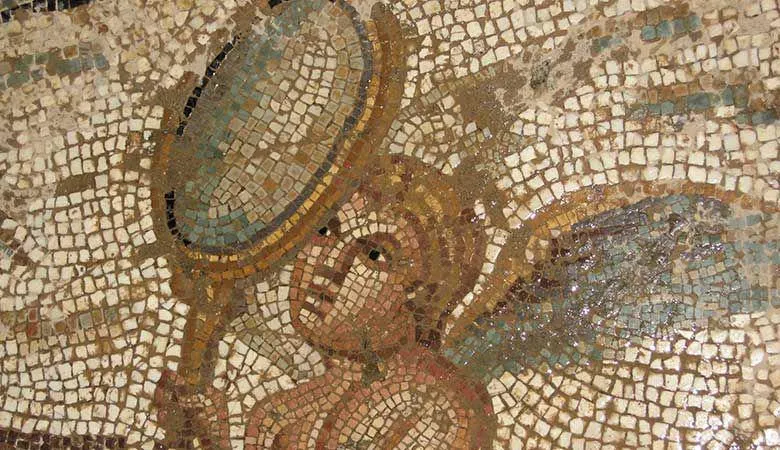Strand Campus
Strand Campus feels like the heart of London—historic yet buzzing with energy. Nestled by the Thames, it offers world-class academics, vibrant student life, and endless inspiration from the city’s culture and diversity.

This Classical Studies with English BA is an interdepartmental course that will allow you to develop an in-depth knowledge of the Classics while also studying English literature. With no required modules, you’ll be empowered to select a syllabus that best suits your interests.
You can expect to build skills and experience in working with Latin and Ancient Greek literature in translation (or optionally in their original form), ancient philosophy, history, art, and archaeology. Your English studies will enable you to see echoes of the ancient world as they are picked up, reinvented, and transformed over the centuries to the modern day.
You’ll join the best university in the UK for research excellence in Classics (REF 2021) and learn from one of the oldest English departments in the country. This offers a range of exciting opportunities that include handling sessions in London museums, like the British Museum and Shakespeare’s Globe, and unique module coverage from the Bronze Age to modern Greece.

My favourite part of the course is how we get to explore our individual interests within the wide range of modules we study.

This Classical Studies with English BA has no required modules, empowering you to build your own curriculum that follows your passions and interests. The only restriction is that you choose three-quarters of your modules from Classics and the rest from English.
If you’re interested in theatre and performance, for example, you could choose to combine modules that focus on Greek and/or Roman drama, the performative context of classical literature, modern experimental theatre, or film adaptations of Elizabethan and Jacobean plays.
If you have a passion for novels, you could connect the dots between ancient epics like Homer’s Odyssey and Virgil’s Aeneid with the development of the ancient novel, the rise of the modern novel in the 18th century, or modernist adaptations of classical works such as James Joyce’s Ulysses. You could also build a curriculum around gender and sexuality as you explore female voices in Greek and Latin literature or look at ancient sexuality and study topics like gender and performance or queer theory.
By combining classical studies and English, you’ll gain skills and experience in Latin and/or Ancient Greek language and texts in translation, literature, philosophy, history, art and archaeology while discovering how Greek and Roman writers have influenced western literature.
If you wish, you’ll also have the opportunity to learn an ancient language. You can start as a beginner, or if you have some knowledge of Ancient Greek or Latin already, you can continue language learning at an intermediate or advanced level. You may also have the option to study other ancient languages such as Hittite. If you do well in Ancient Greek or Latin in your first year and want to focus on languages in your study, then an accelerated language route is also available to you.
In your first year, you could take Classics modules that introduce you to classical literature and thought, ancient history, and the Byzantine world, or you might choose to explore the art and archaeology of Greece and Rome. You could balance this with English modules introducing you to literary theory or American literature, writing about London, or the foundations of English literature. You can even blend English literature and historical context by studying topics like Medieval or early modern literary culture, leaning into the English department’s historical expertise.
The second year of your Classical Studies with English degree will offer you a range of modules that might investigate Homer’s Odyssey, the Latin love poets, ancient sexuality, or the fall of the Roman Republic. If you wish, you could also choose modules from the Department of War Studies or other departments across the Faculty of Arts & Humanities.
Your English-centred modules in the second year could involve researching American popular culture, experimental theatre, Oscar Wilde, gender and performance, the performing culture of Jacobean England, Afrofuturism, and beyond.
It’s also possible to study abroad during the second year of your Classical Studies with English BA. You could spend your second semester in New Zealand, Australia or the USA.
The third year of your Classical Studies with English degree will give you the chance to study topics such as the everyday city in classical literature, Greek religion, or performance literature in antiquity. You could even explore ancient political philosophy, and Neronian literature or learn about how the classical world has influenced modern debates on sexuality or race.
You can also choose from a wide range of English modules, covering themes such as activist texts and Afro-gothic literature to Black and Asian writing in Britain, literature and fame in the 18th Century, and Shakespeare’s London.
You get the freedom to choose whether you want your final year of Classical Studies with English BA to include a dissertation on a topic of your own choice.
There are a number of ways you can enhance your education during your Classical Studies with English degree. For example, you have the opportunity volunteer to promote Latin lessons in disadvantaged schools via the Iris Project.
You’ll be able to improve your writing skills with a range of extracurricular activities, including writers’ workshops, poetry events, and more. You can flex your creative writing prowess by contributing to student publications, like the poetry journal Wild Court, or learn more about how books were made by looking at an actual printing press that’s housed on campus. You could also get involved in the King’s Greek play, student journalism projects, or various campus-published magazines.
Strand Campus feels like the heart of London—historic yet buzzing with energy. Nestled by the Thames, it offers world-class academics, vibrant student life, and endless inspiration from the city’s culture and diversity.